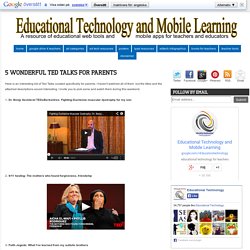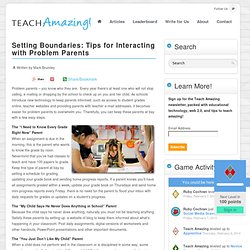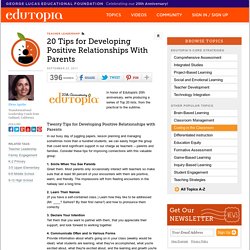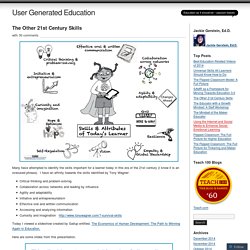

How to Help Teenage Girls Reframe Anxie...hen Resilience. Your child has nightly reading homework. What should YOU should be doing? This guest post comes from Carolyn Wilhelm of the Wise Owl Factory.

Kindergarten, first, and second grade teachers often give children a nightly assignment to read aloud for 10 to 20 minutes. This can be supervised by parents, grandparents, or family members. Usually, a certain level of book or page of text is sent home in a reading folder with a chart for recording book titles or length of time spent reading. What Teens Need Most From Their Parents. The teenage years can be mystifying for parents.

Sensible children turn scatter-brained or start having wild mood swings. Formerly level-headed adolescents ride in cars with dangerous drivers or take other foolish risks. A flood of new research offers explanations for some of these mysteries. Brain imaging adds another kind of data that can help test hypotheses and corroborate teens’ own accounts of their behavior and emotions. Dozens of recent multiyear studies have traced adolescent development through time, rather than comparing sets of adolescents at a single point.
The new longitudinal research is changing scientists’ views on the role parents play in helping children navigate a volatile decade. Ages 11 to 12 As puberty takes center stage, tweens can actually slip backward in some basic skills. How parents set their kids up for success. AngryJulieMonday/flickr "If kids aren't doing the dishes, it means someone else is doing that for them," Julie Lythcott-Haims, former Dean of Freshmen at Stanford University and author of "How to Raise an Adult" said during a TED Talks Live event.

"And so they're absolved of not only the work, but of learning that work has to be done and that each one of us must contribute for the betterment of the whole," she said. Lythcott-Haims believes kids raised on chores go on to become employees who collaborate well with their coworkers, are more empathetic because they know firsthand what struggling looks like, and are able to take on tasks independently. She bases this on the Harvard Grant Study, the longest longitudinal study ever conducted. HOW PARENTS CAN EASILY SEE WHAT THEIR CHILD IS LEARNING AT SCHOOL.
5 Wonderful TED Talks for Parents. Here is an interesting list of Ted Talks curated specifically for parents.

I haven't watched all of them but the titles and the attached descriptions sound interesting. I invite you to pick some and watch them during this weekend. 19 Proven Tips for Getting Parents Involved at School. Google's Schmidt: Teens' mistakes will never go away. When you search "teens do stupid things" on YouTube, you get a treasure trove.
(Credit: BFvsGF/YouTube screenshot by Chris Matyszczyk/CNET) It must be peculiar for children of the Internet age. They are the first to have a complete record of their whole lives. They are the first who'll be able to offer concrete proof of every one of their days, friends, and actions. Eric Schmidt worries, however, that they'll be the first who'll never be allowed to forget their mistakes. As the Telegraph reports , Schmidt spoke Saturday at the Hay Festival in the U.K. and offered some sobering thoughts for those addled by online life. He said: "There are situations in life that it's better that they don't exist. Some days, you could hardly describe most of what happens online as "adult. " In bygone times, he said, they were punished, but allowed to grow beyond youthful indiscretions.
Setting Boundaries: Tips for Interacting with Problem Parents. Written by Mark Brumley Problem parents – you know who they are.

Every year there’s at least one who will not stop calling, e-mailing or dropping by the school to check up on you and her child. As schools introduce new technology to keep parents informed, such as access to student grades online, teacher websites and providing parents with teacher e-mail addresses, it becomes easier for problem parents to overwhelm you. Thankfully, you can keep these parents at bay with a few easy steps.
The “I Need to Know Every Grade Right Now” Parent When an assignment is due in the morning, this is the parent who wants to know the grade by noon. The “My Child Says He Never Does Anything in School” ParentBecause the child says he never does anything, naturally you must not be teaching anything. 50 Best Back-to-School Articles for Parents. In addition to getting your student ready, back-to-school is also a time when most parents revisit strategies that help support their children during the academic year.

What’s your parenting mindset at back-to-school time, or anytime? As a writer and researcher with a passion for positive youth development, I regularly connect with educators and psychologists who write superb articles for parents. These authors share the latest thinking and research on learning, achievement, family well-being, parent engagement, special needs children, youth sports, media, technology, discipline, homework, bullying, and much more.
Twenty Tips for Developing Positive Relationships with Parents. In honor of Edutopia's 20th anniversary, we're producing a series of Top 20 lists, from the practical to the sublime.

Twenty Tips for Developing Positive Relationships with Parents In our busy day of juggling papers, lesson planning and managing sometimes more than a hundred students, we can easily forget the group that could lend significant support in our charge as teachers -- parents and families. Consider these tips for improving connections with this valuable group: 1. Smile When You See Parents Greet them. 2. 3.
How to reconnect with your child after a long day at work: 10 key questions. The Other 21st Century Skills. Many have attempted to identify the skills important for a learner today in this era of the 21st century (I know it is an overused phrase).

I have an affinity towards the skills identified by Tony Wagner: Critical thinking and problem-solvingCollaboration across networks and leading by influenceAgility and adaptabilityInitiative and entrepreneurialismEffective oral and written communicationAccessing and analyzing informationCuriosity and imagination Today I viewed a slideshow created by Gallup entitled, The Economics of Human Development: The Path to Winning Again in Education.